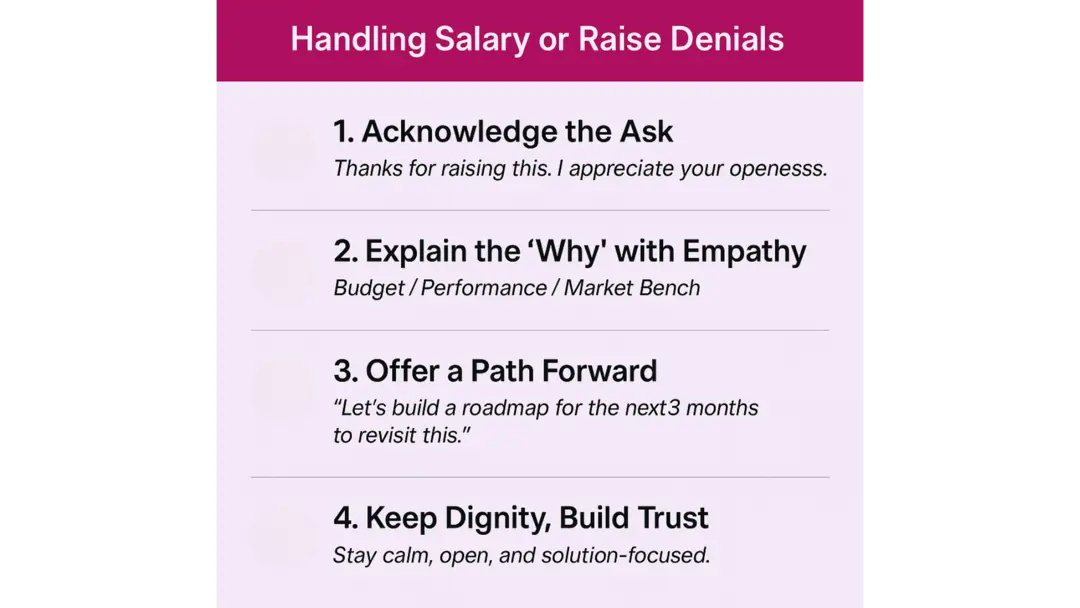Is saying “No” to your team a sign that you’re not a good leader?


Imagine this.
You’re a new manager. A capable team member knocks on your door with confidence.
They’ve taken on more work. Led a few small wins. They believe it’s time for a raise.
You, however, know the truth — whether it’s company budget freezes, compensation structures, or performance metrics not being met — the raise isn’t happening.
And now, the tough part: You have to tell them.
Let’s pause here for a second.
What would you say?
Would you fumble? Deflect? Overpromise? Or… avoid the conversation entirely?
If your stomach turned reading that, you’re not alone.
Many first-time managers struggle with salary or raise denial conversations.
But here’s the truth: Great leadership is not about giving people what they want — it’s about guiding them toward long-term growth, with honesty and compassion.
The Indian Context: More Than Just Pay
In Indian workplaces, a raise isn’t just about the number on the payslip.
It’s also about status, recognition, and progression — often tied to family pride and social standing.
So when an employee hears “no,” they may not just be hearing “you won’t get more money”.
They might be hearing:
- “You’re not progressing.”
- “You’re not valued.”
- “You’re falling behind your peers.”
That’s why, as a first-time manager, this conversation is as much emotional as it is practical.
Leadership Insight:
“Leadership is not about being liked. It’s about being trusted.”
— Simon Sinek
Why This Conversation Is So Difficult
Let’s break it down. First-time managers usually fall into one of these traps:
- Avoidance: “Let’s circle back in a few months,” hoping they forget.
- Blame Game: “I wanted to, but HR didn’t approve it.”
- Overpromising: “Maybe next cycle, definitely.”
- Cold Facts Only: “You didn’t meet the numbers. End of story.”
None of these build trust. And over time, they damage morale, increase attrition, and erode your credibility.
The Right Way to Say No — Without Losing Trust
Step 1: Acknowledge the Ask
People want to feel heard. Start with empathy.
“Thanks for bringing this up, and I really appreciate your initiative. It’s not always easy to talk about compensation.”
Step 2: Be Honest, But Human
Don’t hide behind policies or dump numbers coldly. Instead, frame your response with context and care.
Example 1: Budget Constraints (common in Indian startups & NGOs)
“Right now, due to budget limitations across the company, we aren’t in a position to process salary hikes. This isn’t a reflection of your value — it’s the current reality we’re navigating.”
Example 2: Performance Doesn’t Yet Justify Raise
“I see the effort you’ve been putting in. At the same time, to be considered for a raise, we need to see stronger impact in X and Y areas. Let’s work on that together.”
Step 3: Offer Growth, Not Just Consolation
Indians value progress. So don’t just say no — show a path forward.
“Let’s set a 3-month plan to strengthen these areas. I’ll support you with feedback and mentoring, and we’ll revisit this conversation at the next cycle with clear data.”
Other meaningful options:
- Nominating them for a high-visibility project
- Training opportunities (e.g., Coursera, internal L&D programs)
Leadership shadowing or cross-functional exposure
🧠 Reflect: How You Say “No” Shapes How They See You
Many managers worry: “If I say no, they’ll quit or hate me.”
But if you say no with empathy, offer clarity, and show a path forward — they may actually trust you more.
Employees want real conversations. Not vague promises. Not defensive responses. Just honesty with respect.

Real Example from the Field
In a Bangalore-based IT firm, a newly promoted team lead had to deny a raise to a developer who had taken on extra work.
Instead of avoiding the chat, she sat with him, acknowledged his effort, showed the team budget constraints transparently, and then asked:
“What would growth look like for you in the next 6 months — beyond just salary?”
They co-created a roadmap for him to lead a module migration project.
Six months later, not only did he get his raise — he was promoted.
And he cited that “difficult conversation” as the moment he started trusting her as a leader.
Actionable Tips for First-Time Managers
- Practice the conversation with your HR business partner or a peer
- Don’t delay — delays breed anxiety and gossip
- Write down 2–3 growth options you can offer instead of a raise
- Always end with a follow-up plan or checkpoint
Leadership is Built in the No’s
Saying “yes” is easy.
But real leadership shows up when you say “no” — with empathy, with courage, and with commitment to your people’s long-term success.
As a first-time manager, you will be tested by these conversations.
The good news? Every difficult chat is a chance to build your voice, earn trust, and show that leadership isn’t about pleasing — it’s about growing.
Your Turn:
When was the last time you had to say “no” and felt uncomfortable?
How could you approach it differently now?
Let’s build a generation of Indian managers who are not afraid to have honest conversations — the kind that transform careers.
This article is contributed by the GlobalGyan Editorial Team as part of our Leadership Essentials series. In our series ‘Difficult Conversations for First Time Managers’ by Guan D’Penha, Senior Manager – Learning Solutions at GlobalGyan Leadership Academy, we will be sharing insights on the challenges faced by first-time managers.
Up next in our ‘Difficult Conversations for First-Time Managers’ series: “Are you playing favourites?” — one of the most unsettling questions a manager can face. We’ll explore how first-time managers can ensure fair recognition without letting bias or perception gaps damage trust and morale.






Responses